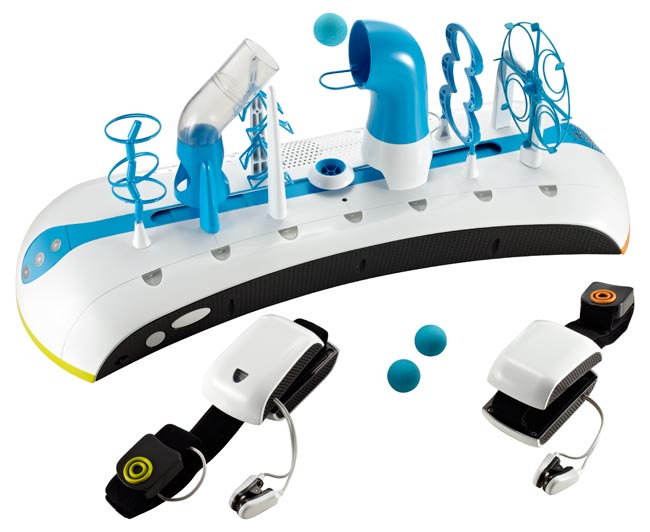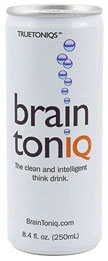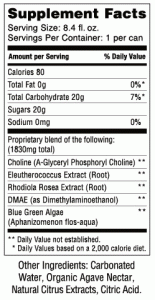Need a Brain Boost? Crank Your Favorite Tunes
 Music stimulates our brains and can support peak cognitive performance in many ways. A new study at McGill University has revealed part of the reason – pleasurable music releases dopamine, a powerful neurotransmitter that the brain uses as a reward. The researchers also found that the stronger the emotional reaction to the music the more dopamine that is released. Some details:
Music stimulates our brains and can support peak cognitive performance in many ways. A new study at McGill University has revealed part of the reason – pleasurable music releases dopamine, a powerful neurotransmitter that the brain uses as a reward. The researchers also found that the stronger the emotional reaction to the music the more dopamine that is released. Some details:
The team at The Neuro measured dopamine release in response to music that elicited “chills”, changes in skin conductance, heart rate, breathing, and temperature that were correlated with pleasurability ratings of the music. ‘Chills’ or ‘musical frisson’ is a well established marker of peak emotional responses to music. A novel combination of PET and fMRI brain imaging techniques, revealed that dopamine release is greater for pleasurable versus neutral music, and that levels of release are correlated with the extent of emotional arousal and pleasurability ratings.
You can listen to the music they used in the study here.
Pleasurable music is a powerful and natural source of mental energy. Need a brain boost? Turn to your iPod.
Interested to hear from readers that use music in their brain training or physical workout routines.
Categories: Mental Focus, Music and Audio Tags: EQ
Brainwave Control Toys Move Forward
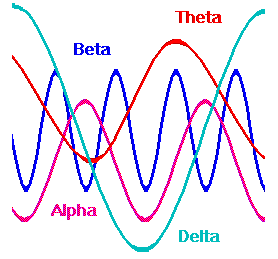 Learning to control your brainwaves through concentration, relaxation, visualization, meditation and other techniques is a cornerstone for peak cognitive performance. Learning to control your brainwave is often difficult because you don’t have direct and immediate feedback on what state you are in. Neurofeedback devices that display information about brain states in real-time solve that problem. The devices work on a brain-to-computer interface and have recently move into the consumer market.
Learning to control your brainwaves through concentration, relaxation, visualization, meditation and other techniques is a cornerstone for peak cognitive performance. Learning to control your brainwave is often difficult because you don’t have direct and immediate feedback on what state you are in. Neurofeedback devices that display information about brain states in real-time solve that problem. The devices work on a brain-to-computer interface and have recently move into the consumer market.
You can get simple models for home use and they have been built into games.
Neurofeedback offers one of the best hopes for a breakthrough in brain training and peak cognitive performance.
So I am always on the look out for new consumer-level neurofeedback devices that might be of interest to readers of the Next Brain Brain blog. Mattel has announced a new version of their Mindflex mental acuity game, call Mindflex Duel: The cost is $99. Here is the short story:
“Using advanced technology, Mindflex Duel headsets sense brain activity and send messages to the game platform. Strap on a headset, connect the sensor clip to your earlobe, and align the strap’s metal sensor so it’s flush against your forehead. Your brain activity will trigger the game platform’s motors, which will propel the ball. Bulk up your brain, sharpen your focus, and battle your friends with this hands-free challenge!”
Being able to do neurofeedback in a competitive mode could be a big step forward in using the technology for brain training.
Very interested to hear from readers that use home-based neurofeedback to improve brain function and achieve peak cognitive performance.
Categories: Executive Function, Mental Focus, Software Tags: games, neurofeeback
Action Video Games Work Mental Muscles Big Time
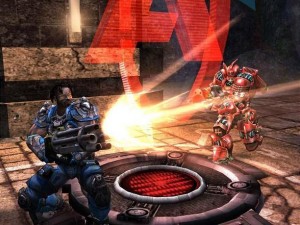 Multiple experiments done by Daphne Bavelier, professor of brain and cognitive sciences and her group at the University of Rochester, strongly suggest that action video games improve perception (speed and accuracy), attention (including multi-tasking), decision-making and other aspects of cognition.
Multiple experiments done by Daphne Bavelier, professor of brain and cognitive sciences and her group at the University of Rochester, strongly suggest that action video games improve perception (speed and accuracy), attention (including multi-tasking), decision-making and other aspects of cognition.
That is an amazing workout for the brain especially if you are getting it by having fun. The key is to play a game that is first-person and includes a lots of action or visual-motor coordination. My favorites are Geometry Wars and Soul Caliber 4.
Interested to hear from readers that play action video games. Which games do your play? Can you feel them working your mental muscles?
Categories: Decision Making, Memory and Learning, Mental Focus, Perception, Software Tags: brain training, games
Does Teasing Your Brain Make it Stronger?
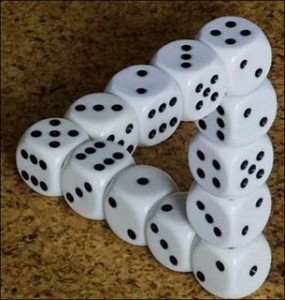 There is some evidence that we can enhance our brain function and cognitive performance by regularly solving puzzles, problems, riddles or games that tease our brain. Teasing means presenting some enjoyable mental challenge that is not too easy but not too hard.
There is some evidence that we can enhance our brain function and cognitive performance by regularly solving puzzles, problems, riddles or games that tease our brain. Teasing means presenting some enjoyable mental challenge that is not too easy but not too hard.
Classic crossword puzzles and the more recent Sudoka number-pattern puzzles are popular brain teasers. Some people love them others find them boring.
The key is to find the type of brain teaser you enjoy and enjoy it regularly.
If you have not discovered your inner brain teaser, or are shopping for new ones (always a good idea), check out Top 10 Brain Teasers and Games for Adults and Kids from Sharpbrains. You are sure to find something you like. If you do, the next challenge is find a steady supply of similar challenges.
Very interested to hear from readers that enjoy brain teasers. How do they enhance cognitive function?
Image Source: Fanpop!
Categories: Cognitive Decline, Lifestyle, Mental Focus, Perception, Problem Solving Tags: games
2nd Language Boosts Cognitive Control & Reserve
 According to research recently reported in the Wall Street Journal, Building a More Resilient Brain, you can improve thinking and brain health by learning a new language. There is some evidence that learning a second language can improve your cognitive control (stop paying attention to one thing and focus on another) and may stave off the effects of dementia for several years by building up cognitive reserve. Unfortunately, it is not know when in life it is best to learn the language and if you need to use it daily to get these benefits.
According to research recently reported in the Wall Street Journal, Building a More Resilient Brain, you can improve thinking and brain health by learning a new language. There is some evidence that learning a second language can improve your cognitive control (stop paying attention to one thing and focus on another) and may stave off the effects of dementia for several years by building up cognitive reserve. Unfortunately, it is not know when in life it is best to learn the language and if you need to use it daily to get these benefits.
Learning a second language is a major undertaking but does promise to improve brain function and cognitive performance. Very interested to hear from readers that have learned a second language and believe it has had brain boosting effects.
Categories: Child, Cognitive Decline, Memory and Learning, Mental Focus, Older Adult, Training Tags:
Advanced Neurofeedback Training Near You?
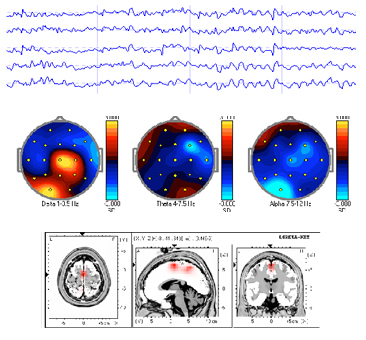 In neurofeedback training you learn to regulate your brainwaves. As the neurons in your brain fire they produce an electrical signature across your scalp call an Electroencephalograph or EEG. The EEG is detected using sensors on your head and is feed into a device that turns it into a signal such as a beep, movement of the cursor on a computer screen, a change in a video game or even the motion of a remote control toy. The idea is that the signal acts as feedback for learning to get your brain into a certain state such as relaxation, creative flow, higher processing speed, greater focus and so on.
In neurofeedback training you learn to regulate your brainwaves. As the neurons in your brain fire they produce an electrical signature across your scalp call an Electroencephalograph or EEG. The EEG is detected using sensors on your head and is feed into a device that turns it into a signal such as a beep, movement of the cursor on a computer screen, a change in a video game or even the motion of a remote control toy. The idea is that the signal acts as feedback for learning to get your brain into a certain state such as relaxation, creative flow, higher processing speed, greater focus and so on.
Neurofeedback is a powerful tool for improving your brain function and cognitive performance and will be covered frequently on the Next Brain Blog. Getting access to clinical grade neurofeedback training can be hard and costly. That may be changing with Neurotopia’s recent announcement of a remote version of their NeuroStation:
“The NeuroStation™ REMOTE is the first technology designed specifically for widespread adoption of neurofeedback. Neurotopia represents a paradigm shift by bringing neurofeedback into the consumer market through healthcare providers, academic centers, and sports performance facilities.”
Neurotopia is well-known for using the most advanced protocols and equipment to achieve real results with neurofeedback. They have specific protocols for achieving peak performance. It includes zone, reaction time, balance, recovery and sleep techniques and is applicable to sports, business and all walks of life.
Interested to hear from readers that have experience with Neurotopia’s approach or other clinician delivered neurofeedback training for peak cognitive performance.
Categories: Mental Focus, Software, Training Tags: neurofeeback
Drinks Spiked With Cognitive Enhancers
 There are a growing number of drinks – flavored, caffenitated, organic and high-energy that have been specially formulated to improve your brain function and cognitive performance.
There are a growing number of drinks – flavored, caffenitated, organic and high-energy that have been specially formulated to improve your brain function and cognitive performance.
Take for example, the brand new product Nawgan. It was developed by a brain scientist, comes in berry flavor (caffeintate or not) and claims:
“The Nawgan formula supports memory and thinking skills in four ways. First, the lycopene in the beverage provides anti-inflammatory protection. Second, the natural vitamin E provides powerful anti-oxidant protection. Third, the alpha-glyceryl phosphoryl choline and citicoline (cognizin®) helps to increase acetylcholine levels in the brain (acetylcholine is critical for memory and thinking skills). Fourth, the citicoline also helps to provide structural support to brain cells, (phospholipids).”
You can buy it online for the price of an energy drink but must buy a case.
For a different approach, consider Brain Toniq that bills itself as botanical-based “think drink” designed to improve mental focus. An antidote to brain fog.
Another alternative is Focus Up, a prepackaged powder you can add to a bottle of water.
Interested to hear from readers that use drinks specially formulated to boost brain function and cognitive performance.
Categories: Cognitive Decline, Diet, Mental Focus Tags:
Does Inner Voice Improve Cognitive Performance?
 We all have an inner voice. In fact, we talk to ourselves silently throughout the day. Our inner voice is a big part of our mental life but what role does it play in improving brain function and cognitive performance?
We all have an inner voice. In fact, we talk to ourselves silently throughout the day. Our inner voice is a big part of our mental life but what role does it play in improving brain function and cognitive performance?
Found an interesting new study from the University of Toronto that suggest Inner Voice Plays a Role in Self Control. Here is what they claim:
“Through a series of tests, we found that people acted more impulsively when they couldn’t use their inner voice or talk themselves through the tasks,” says Inzlicht. “Without being able to verbalize messages to themselves, they were not able to exercise the same amount of self control as when they could talk themselves through the process.”
What kind of self talk works best? There has been a lot written on avoiding negative self talk especially if it involves cognitive distortions (e.g. I NEVER do anything right) as well as the power of positive self talk. The interesting thing about the Toronto study is that it did not control for the tone of your inner voice. Common sense suggests keeping neutral or positive and task focused is best.
Like to hear from readers that use inner voice to improve cognitive performance. What do you say and why do you think it works?
Categories: Executive Function, Lifestyle, Manage Emotions, Mental Focus, Training Tags:
Simple Rituals that Make Time for Deeper Thinking
I often hear from students, readers and clients that they don’t have time to think. Bombarded with requests, overloaded with tasks and trying to adapt to a dynamic and stressful environment leaves no time for deep thinking. When trying to work on bigger tasks that require significant thought they do so for a short time before they get interrupted, start to worry about something else or just slip into brain fog.
Simple rituals are one of the best ways to increase the duration of your mental focus and concentration. The key is to keep it simple and practice it regularly.
 An example is the Pomodoro Technique. To make it work you:
An example is the Pomodoro Technique. To make it work you:
1. Select a task to work on
2. Set a timer for 25 minutes
3. Work on just that task until the timer goes off
4. Rest for 5 minutes
Afterwards you can either stop, go back to step 1 and pick a new task or continue to cycle through the steps on the first task until the work is done.
Pomodoro is Italian for tomato. The person that developed the technique, Francesco Cirillo, is Italian and used a kitchen timer that looked like a tomato. This may seem too simple to work but it does. The timer is critical as it creates the conditions that allow us to escape into the task at hand.
For more information on the Pomodoro technique check out the video on the Lifehacker blog. You can get a free e-book and purchase supporting materials directly from Francesco Cirillo and the Pomodoro team.
Of course there are many other simple rituals that achieve the same thing. Interested to hear from readers about the techniques they use to make time for deep thinking.
Categories: Mental Focus, Training Tags:
Memory Champions Win by Training Not Genetics
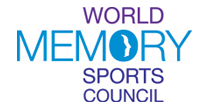 Organized and professionally managed memory contests are growing in popularity worldwide. For example, the United Kingdom Open Memory Championship was just held in August. Many amazing feats were recorded including a mental athlete that was able to memorize a deck of 52 cards in sequence in 80 seconds.
Organized and professionally managed memory contests are growing in popularity worldwide. For example, the United Kingdom Open Memory Championship was just held in August. Many amazing feats were recorded including a mental athlete that was able to memorize a deck of 52 cards in sequence in 80 seconds.
The World Memory Sports Council captures data on competitions, memory events and records. Events range from memorizing the order of cards to historic dates and linking names and faces.
To qualify as a grand master of memory you must achieve the memorization of:
- 100 numbers in an hour
- 10 decks of cards in an hour (520 cards)
- One deck in two minutes or under
No easy feat. It is interesting to note that grand masters, record holders and winners in the various national memory championship tend to claim the same thing:
It does not take high IQ or other special mental gifts to be a memory champion. Instead it takes discipline and the willingness to train intensively.
This is great new for readers of the Next Brain Blog. It suggests that systematic training can greatly improve brain function and cognitive performance. It also provides a context to test your brain fitness and compete in a national or international memory championship.
Very interested to hear from readers that participate in the mind sport of memory. What techniques do you use to train? Has this training improved your cognitive performance in everyday life?
Categories: Memory and Learning, Mental Focus, Training Tags: contest

